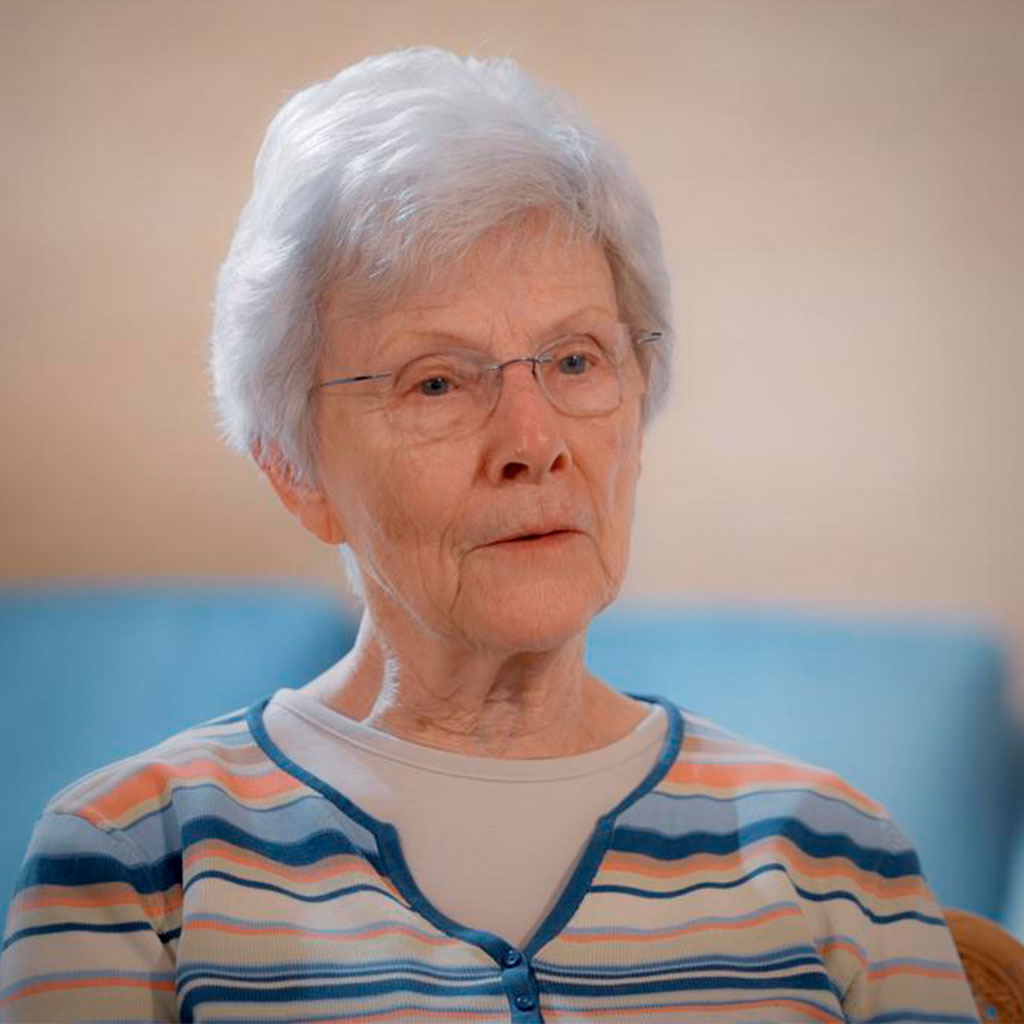
Shirleyan was in high school in North Bay when she learned about the Farmerette program in Southern Ontario. The idea that adventure and freedom were possible by volunteering to work in food production was hard to resist. She said girls were signing up “like crazy”. The year was 1952 and her application was completed and mailed to Toronto.
The acceptance letter and the train tickets arrived and along with them was the information of what to pack. She was off to Thedford for the summer. Shirleyan, like Roberta, worked in the peppermint and onion fields. She found a boyfriend that summer and he was the son of the farmer she worked for. Plans to return the following summer were dashed when the announcement was made that the Farmerette program would not be continued. When she connected with Bonnie Sitter, she discovered that she had dated the boy who became Bonnie’s brother in law.
Even now at age 89 she has fond memories of that summer and working with Roberta Henderson at the Sitter farm. “Still the best summer of my life” are words she has repeated over and over. When she connected with Bonnie and informed they we were going to write a book, she said: “Ok”.
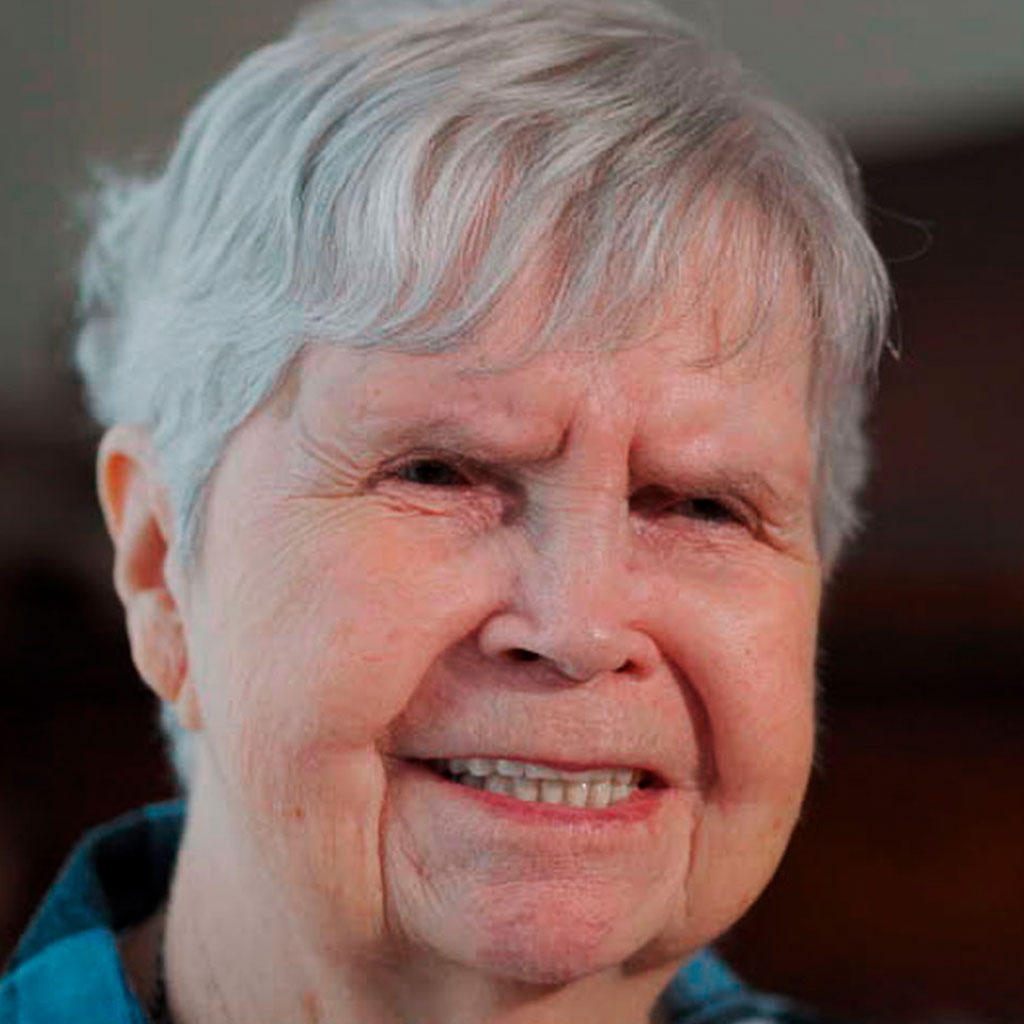
Bernice, of Wiarton, Ont., in Bruce County, was a Farmerette living in the converted gymnasium of the former Waterford High School in Norfolk County. She was one of approx. 35 girls sleeping in bunk beds and going out to the fields each day to assist in food production. There were strawberries to pick and vegetables to hoe. Lots of back breaking work in the hot sun.
In 1945, during the last year of the Second World War, she was among the thousands of teenage girls who answered the call to volunteer with the Ontario Farm Service Force in the Farmerette Brigade. Food production needed help! They laboured in the fields and orchards and canning factories of Southern Ontario while the men were off in Europe bringing the Third Reich to heel.
Bernice and other Farmerettes were having supper at a Chinese restaurant in Waterford when Peter and his gang struck up a conversation. The visit ended with a car ride back to Waterford High School and a promise from Peter that he would meet Bernice at the high school three days later for a harvest party dance. Bernice made sure he would come to the dance by taking his watch with her. He would have to go to the dance if he wanted his watch back.
“I was one of the best dancers in Waterford,” Peter is quoted as saying. He grew up on a farm in Round Plains, west of the town. “I don’t like to brag, but I knew all the dances – the polka, everything. I was a heckuva dancer.” “I danced with her every dance,” Peter, in his mid nineties recalled. “She wouldn’t let me dance with anyone else. We both loved to dance. We danced together right up until about ten years ago.”
Peter and Bernice dated for a couple of weeks after they met and before she returned home for school. One of those dates, Peter said, included a night at the Summer Garden in Port Dover, where the live entertainment featured a performance by Chuck Berry. He said the set included a 17-verse rendition of the risqué classic, My Ding-a-ling.
After Bernice departed, Peter couldn’t get her out of his mind. In November, 1945, he made the long drive to Bruce County in search of his sweetheart. Peter had forgotten Bernice’s phone number and ended up sobbing in his 1935 Dodge when no one would help him find her. But, a couple of hours later, there she was tapping on his vehicle window. Tears were still rolling down his cheeks. “I was so happy to hear her knock on the window,” Peter said.“I stayed for a week and then didn’t see her again till she came back in the spring.”
The couple married July 27th in Wiarton in the summer of 1946. A love story with a whole lot of dancing included!
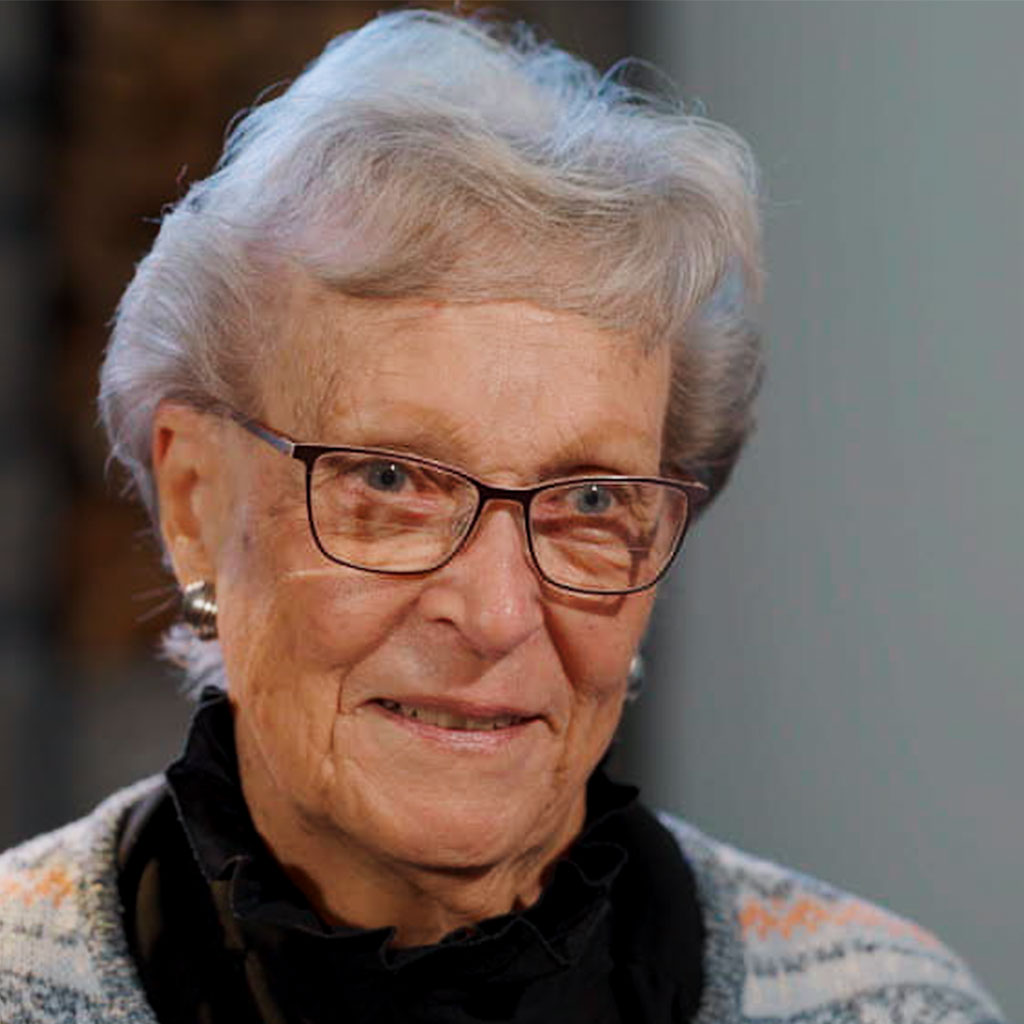
The summer of 1952 is remembered with fondness by Roberta. She served at Thedford Farmerette Camp and worked for the Sitter family the entire season. She wasn’t a farm girl, having grown up in Galt, but she fit right in and called Bill Sitter, her boss, “Daddy” and Grandpa Nick Sitter “Grampa” as she worked alongside their children/grandchildren George and Mary Ellen who were teenagers too.
After reading an article titled “Farmerettes Helping At Home” in a magazine called “Our Canada” she reached out and connected with Bonnie Sitter. There had to be a connection with the author’s name being Sitter and of course there was.
Roberta remembers the kindness of the family and how Grampa Sitter, dressed in his former dress trousers, shirt, tie and vest and wearing his black fedora supervised the Farmerettes and kept their hoes sharp. A sharp hoe, she recalls, made a tough job a lot easier. The crops were mostly peppermint and onions and she chuckles that the other girls in camp could always tell where she had been working by the “smells” clinging to her when she arrived back at camp.
Dog tired after hours of physical labour, a shower and dinner revived the girls and there was time to rent roller skates at the Thedford arena and have some fun. Curfew was 9:30 p.m. so the clock was watched carefully. Movies, swimming and camp fires certainly made it feel like “camp”.
When the harvest season ended in1952 so too did the Farmerette program. As a 16 year old that summer Roberta’s claim to fame was that she was the youngest Farmerette at Camp #6.
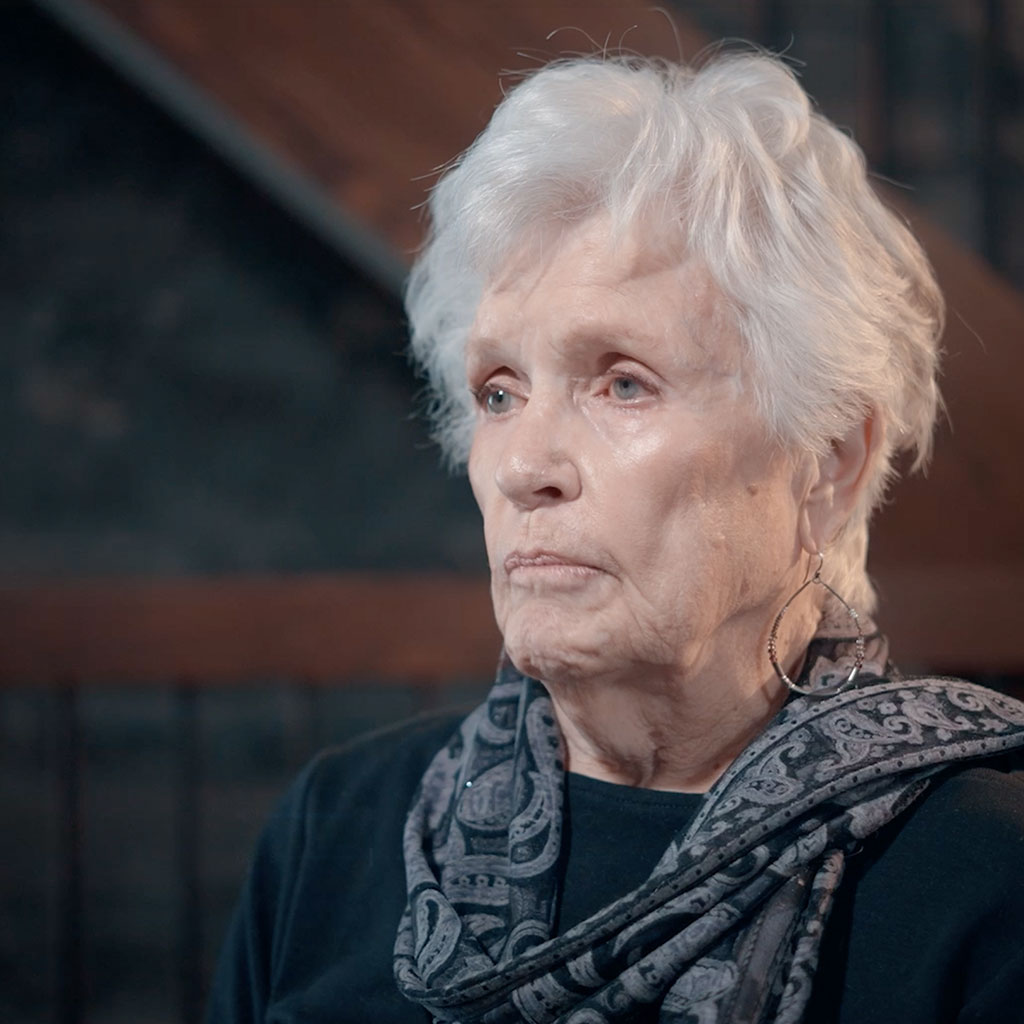
In 1945 Betty-Lou boarded the train in Sault Ste. Marie with her girlfriends to spend the summer as Farmerettes. Permission from parents had been secured and Betty-Lou qualified age wise and had good grades . The real attraction for volunteering was getting out of writing the final exams and passing to the next grade. The deal was if she worked the 13 weeks she committed to, her transportation was paid back to Sault Ste. Marie. Patriotism wasn't on her mind but rather passing to the next grade without writing the dreaded chemistry exam.
She clearly remembers working for Horace Troupe and the routine of harvesting asparagus day after day.
Sandwiches packed for lunch break were often peanut butter or cheese and some fruit. Cold water came from the farm well. Mr .Troupe carried the pail to them and everyone used the same dipper.
Transportation to and from the fields was in a truck without sides or a back rail. Farmerettes hung on as best they could and often dangled their feet off the back. One day the truck Betty-Lou was dangling her feet from hit a pothole and Betty-Lou bounced off and hit her head. She had a concussion and her mom arrived from Sault Ste. Marie, determined to take her home. Betty-Lou convinced her mom to let her stay and finish the job.
The day the war ended was memorable. A farmer arrived at Camp Gregory with his stake truck and announced there was a parade in St. Catharines and to pile in, as they were going to celebrate! Betty-Lou's memory is still filled with emotion as her thoughts that day were that her Dad would be coming home.
Time well spent, she told Bonnie.
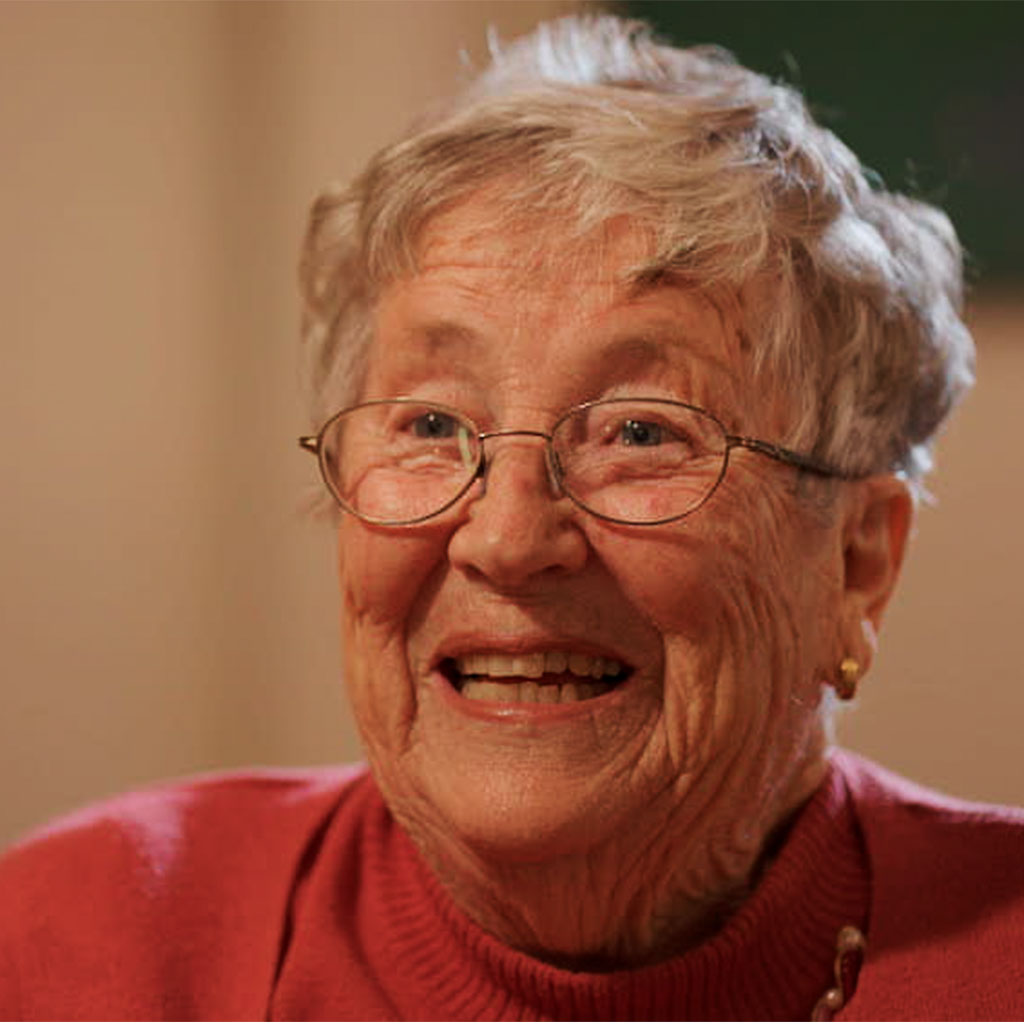
The war had ended, but the need for volunteers in food production had not. In 1947, Isobel was 17 and living in Clinton, Ontario. With a girlfriend urging her on, she volunteered to be a Farmerette. In later years she described herself as the country version of Rosie the Riveter.
The journey to the camp involved a train ride to Toronto, then a boat ride on the S.S. Cayuga across Lake Ontario to Port Dalhousie and finally a bus to the A.W. Smith Farm at Vineland Station.
Her memories include being homesick and calling home, asking her boyfriend to come and visit. Luckily Joe Gibson had a war surplus Harley Davidson and he made the trip. It was the first of several visits. Joe and Isobel married and farmed in the Seaforth area.
Her memories describe what her camp was like, the work she did and the meals that were prepared for the Farmerettes. Isobel remembers that the worst job was thinning the peaches and dealing with the peach fuzz which caused nasty rashes. Long days that started at 7a.m. and ended at 6pm with an hour for lunch resulted in tired aching bodies, often with a sunburn.
Good memories include working alongside interned Japanese girls and boys who were a similar age. Camaraderie was a big part of the experience.
Even now, the 4 months as a Farmerette are recalled as time well spent.
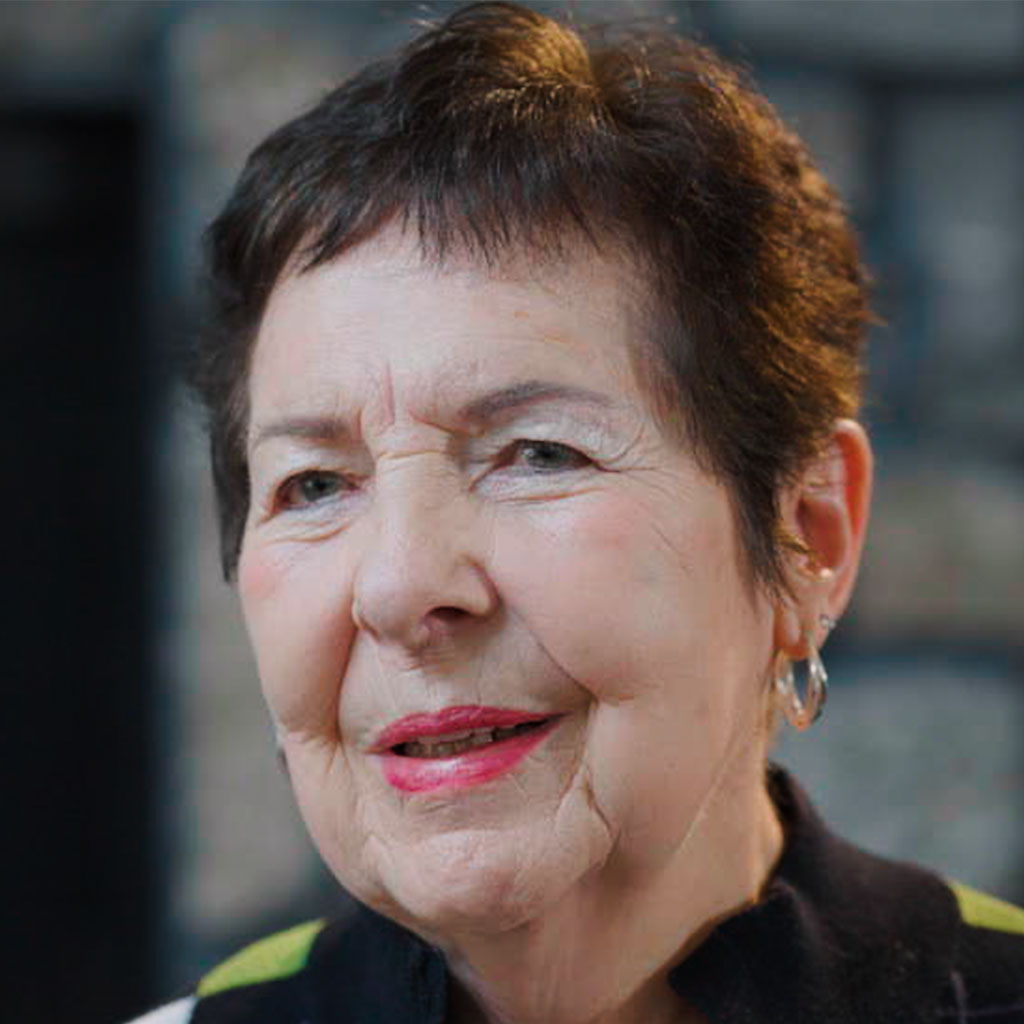
Mary grew up on a farm in the Fergus, Ontario area where her mother was in charge of raising seven children on her own. There were nine at the table, counting the hired man.
Although life could be tough, she recalls they never went hungry and each child had “chores”. Her older sisters led the way and began spending their summers working on local farms at age 12. Mary was mature for her age so at age 10 she had her mom’s permission to spend summers and weekends with the Robb family on their progressive farm on the 6th Line of Maryborough Township. She was called the “hired girl”. She learned a strong work ethic at the farm, and the phrase “ hard work never hurt anyone” was instilled at an early age.
From 1948 to 1956, Mary not only worked in the Robb’s kitchen learning culinary skills but in their vegetable garden and the fields. Cooking, washing dishes, canning fruits and vegetables, doing laundry and ironing made the days fly by.
Working for the Robb family resulted in a love story too, and Bruce, who also worked for the Robb family for 5 years, became a serious boyfriend and then her husband.
There was fun to be had and drive-in movies with Bruce and baseball games in Moorefield are remembered with a grin. Baseball was a serious sport in the community. So serious, in fact Mary remembers they imported pitchers!
When Mary graduated from high school, she went to Guelph General Hospital to study nursing. Unfortunately, Mrs. Robb missed seeing her protege Mary become an RN. She would have been so proud! She died a month before the ceremony, but her hard working “hired girl” had learned how to succeed.
Read more of Mary’s story beginning on page 114 in Onion Skins and Peach Fuzz.
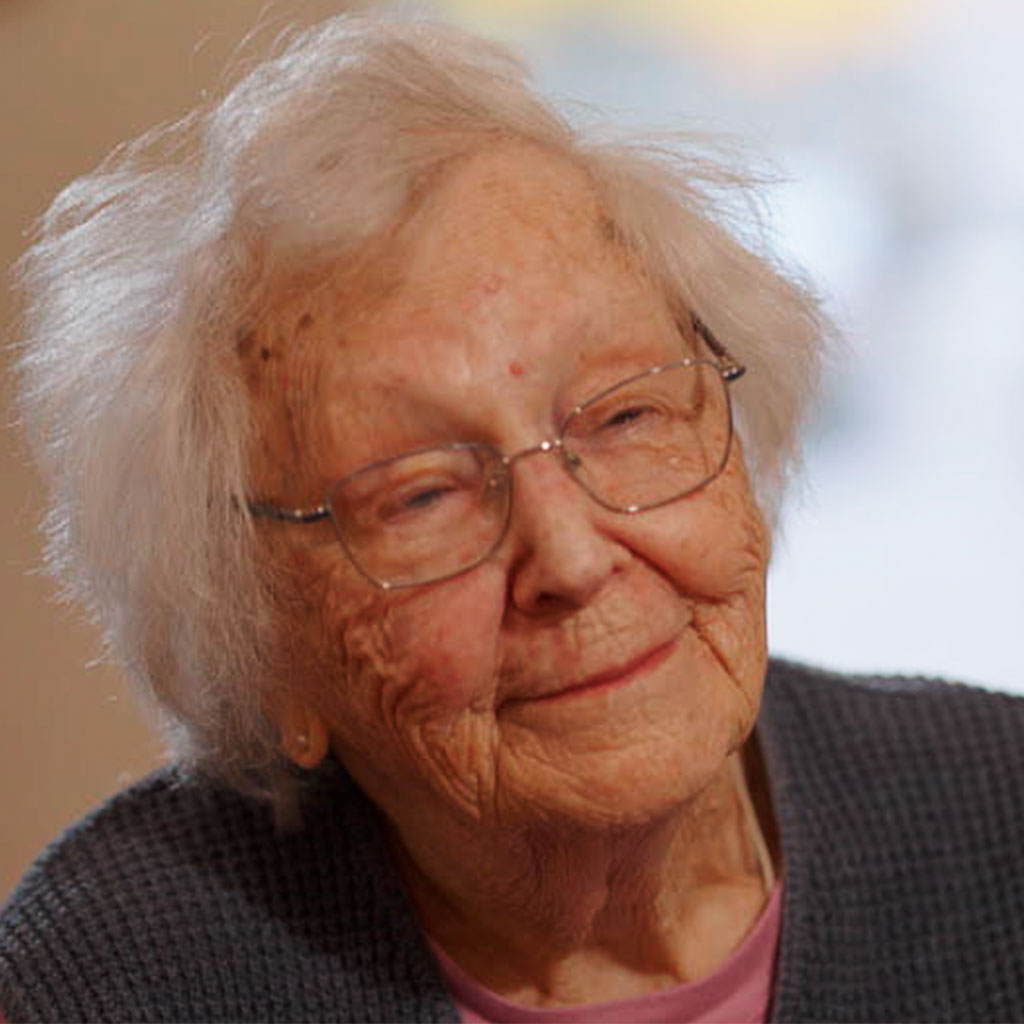
Having celebrated her 100th birthday in 2024 it is indeed exciting to introduce Farmerette Denise.
Bonnie was fortunate to meet Denise soon after Onion Skins and Peach Fuzz was published. She attended a presentation at a museum near her home in London, Ontario.
With her daughter she came forward and introduced herself to Bonnie at the end of the presentation. Although she missed being in the book, she has a story to tell.
She and her sister and neighbouring girlfriends signed the Farmerette Pledge in 1941 and 1942. They served at Camp Winona and worked for E.D. Smith too. She recalls picking a lot of strawberries for a lot of jam that was being made and shipped to Great Britain! The rich soil beside the Niagara escarpment proved to be perfect for strawberries. Up until WWII, a lot of jam was being imported from Britain. That changed and during WWII there was a program called Jam For Britain. It was a campaign launched by the Red Cross. The berries would have rotted in the fields if the teenage girls had not stepped up to work.
Climbing ladders to pick the peaches and posing on them were photo opportunities not to be missed. They were proof you had been a Farmerette and Denise was one of the lucky teenagers who had a camera. Another way to prove you had served with the Ontario Farm Service Force was to get a photo of yourself posing on a tractor.
Home was just across Lake Ontario in Toronto, so Denise, if she budgeted carefully, could take “the odd trip home” and pay for the return trip on the S. S. Cayuga. It was an easy trip by boat. Always in the back of her mind was the curfew deadline to be back at camp. She tells the story of how her mother would comment on how well she looked. Farm work and fresh air agreed with her.
Hitchhiking to Niagara Falls was a chance to get out of the bib overalls and get dressed up for more photos. Her photos show the Farmerettes with big smiles and the picturesque falls in the background.
When it came time to express her feelings about why a Canadian Postage stamp should be issued to recognize the Farmerettes she put pen to paper in March of 2022 and urged the committee to take action. She told them it would be a way to honour their service. She was right!
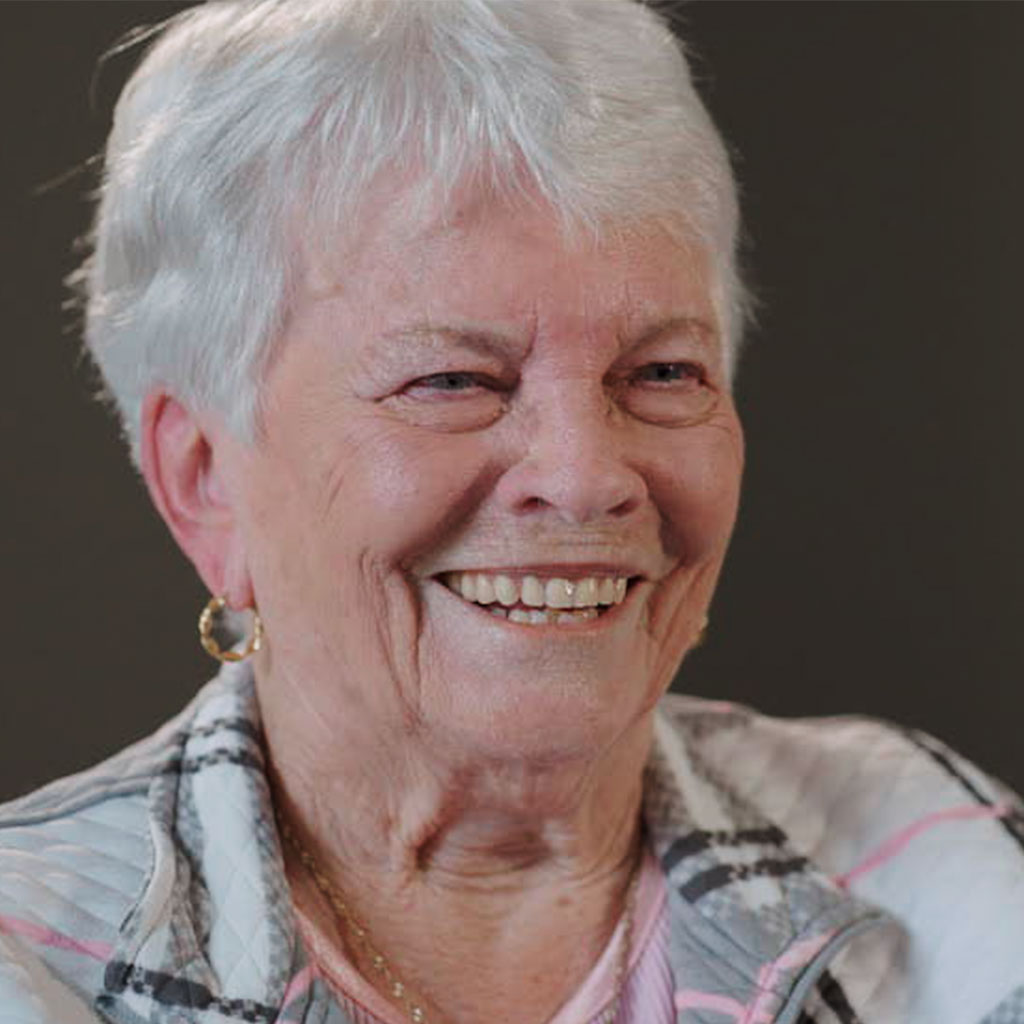
The summers of 1948 and 1949 were both spent at Farmerette Camp at Thedford. Gwen was 16 and living in Cornwall and it took some convincing for her to be allowed to travel with her 2 girlfriends to Camp # 6. The Farmerettes were also known as “Camp Girls” and in some years, a hundred teenage girls were housed in the converted grist mill.
Gwen was especially well treated by the Carrothers family where she worked in the onion fields. There were days when she worked alone that she was invited into their home to have her packed lunch. Mrs Carrothers often shared a slice of pie. Gwen did work on other farms and recalls a farmer’s son offering to give her a ride back to camp but then wanting a kiss in return. She refused, and never worked at that farm again. Picking cucumbers didn’t work out so well either.
Hitchhiking to the sandy beaches of Lake Huron for a swim at well known places like Grand Bend and Ipperwash often proved to be exciting. Local boys with cars found that the young and beautiful Farmerettes were happy not to have to hitchhike and worry about being back before curfew.
Salt pills and sunburns remain part of the memories. Even today, Gwen says that it didn’t seem like work. It was fun! The camaraderie of girls working together and helping the farmers was a great experience. Getting a good tan was a bonus.
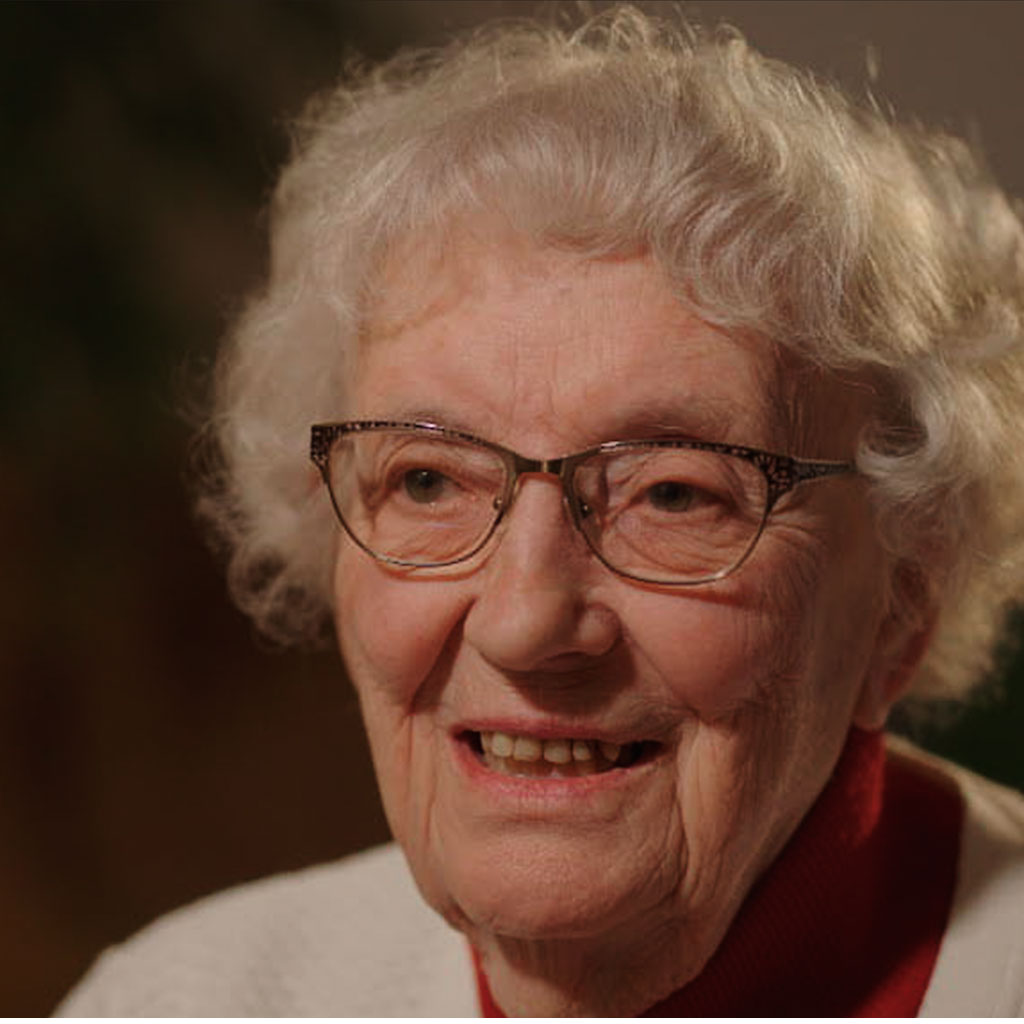
Born in 1930 on a farm near Kenaston SK, Cathryne was raised in Fort William which is now Thunder Bay. Farming during the “Depression” was difficult and opportunities looked better in Ontario.
Cathryne and her sister learned about the Farmerette program at their high school and their mom, being a teacher, thought it would be a great experience and so they volunteered and boarded the train for the long trip to St Catharines. Lunch had been packed with sandwiches and cookies and soldiers sitting nearby offered money for cookies but she can’t remember selling any!
Her placement was on the Tregunno Farm where her home for the summer was a Nissen Hut that had 4 cots for 4 Farmerettes. There was room for a few orange crates for “stuff” and a rack for hanging some clothes. It was comfortable and a move up from what girls had experienced when tents were used in 1941 when the program began. Everyone got along well and lasting friendships were made.
Asparagus was ready to be harvested so the backbreaking job of cutting asparagus began on the first morning at camp and continued until the season ended. Day after day after day. Next was transplanting tomato and cabbage seedlings. Following that they picked strawberries and thinned the peach trees. The terrible fuzz on the peaches caused a nasty seeping rash. Then it was time to pick tomatoes and then climb ladders to pick cherries and then later in August peaches were picked.
Cathryne, like most Farmerettes at camps anywhere near Niagara, hitchhiked to view the falls and on occasion crossed the border to shop. A particularly fond memory was going to an arena in Niagara on a Saturday night and hearing for the first time an orchestra playing the big band popular tunes of the day.
The experience was so good in fact, Cathryne returned to serve in 1948, this time at Grimsby Beach. They loved the swimming opportunities and headed to Lake Ontario after work whenever possible. Hard work it was, but their young bodies adjusted to it and the farmers treated them well. The farmers often told them he couldn’t have done it without them. The farmers depended on them to get the job done and they didn’t disappoint.

Although born in the United States, Beryl grew up in Petrolia. At age 18 in 1945, she signed up and volunteered to become a Farmerette. Her best friend Lois Duncan and her sister Jean and Jean’s friend Mona Dougall couldn’t resist the thought of getting out of writing exams either.
They were accepted and tickets arrived along with instructions of what to take to camp and the list included sheets and pillow cases. Off they went to a small farm camp called Goodwins in the Niagara Peninsula. Beryl thinks there were probably 20- 30 girls at this camp.
This was Beryl’s first camp. She and Lois picked fruit, hoed, harvested vegetables and found out quickly what farm labour was! First day on the job meant cutting asparagus and bending at the waist, hour after hour. Beryl recalls that the farmer told them if they listened carefully they would hear the asparagus squeaking because it grew so quickly. That was the morning. In the afternoon, they switched to picking strawberries! Again, no sitting or scooting along on her butt. Squatting was how she described it.
She told Bonnie she really hated asparagus. Never ate it at home so she had a shock when cream of asparagus soup was on the supper menu. She turned up her nose and waited for the main course. Oops, they served creamed asparagus on toast. It was eat it or starve, so she ate it and surprisingly she discovered it wasn’t so bad after all. To this day she thinks of that first meal at Goodwins whenever she has asparagus.
Beryl and Lois worked side by side with Japanese internees while at Goodwins. They invited the girls to use their shower facilities but the house mother wouldn’t allow it. Beryl hatched a plan and instructed the other Farmerettes to refuse to work the next day until the Japanese girls were allowed to use the camp showers with them. The Farmerettes agreed not to show up but by the time morning came they abandoned that plan and went to work. Beryl and Lois were told to pack their things and they were moved to Vineland Camp. Having never budgeted her finances, she recalls phoning home, likely reversing the charges, and asking her dad for money to pay for room and board.
At age 98, it isn’t easy to remember everything but she smiles as she remembers dancing on the side of the road to music from a car radio. Of course there were boys looking for fun!
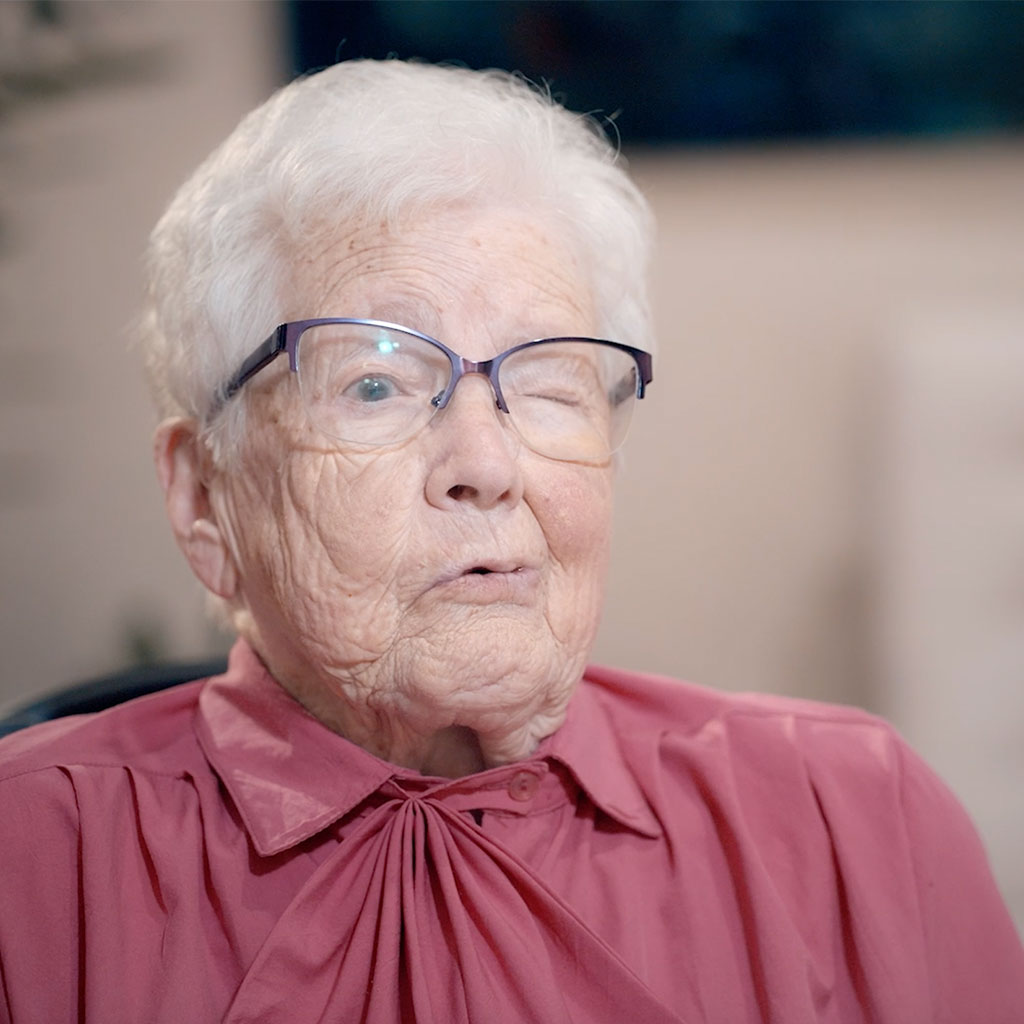
The summer of 1949 proved to be special for Betty, who was 16 at the time and attending Walkerville Collegiate in Windsor. She and 2 girlfriends volunteered with the OFSF and were off to Camp Cottam. Just 33 miles from home, it was not a lengthy trip like so many girls experienced. There were about 45 girls to share the work and the fun. Betty worked for Mr. and Mrs. Abraham Mathies and a special friendship grew out of that farm placement.
About two weeks after arriving at camp a dance was arranged at her Camp Cottam and the Boys’ Brigade from Harrow, just 15 miles away, were invited. Most of the boys at Harrow Camp were from Northern Ontario, towns like Kapuskasing, and spoke only French and the Farmerettes spoke limited high school French so conversations were limited that night. Betty spotted someone she thought was a good dancer and got introduced to John Stafford. He was a handsome blonde headed boy who could speak English. A romance began that continued for eight years. Because John was from a farm in Huron County, it was a long distance letter writing affair. In fact Betty estimates a thousand letters were mailed between the two of them. When wedding bells did ring it was 1958 and Mrs Mathies, the Farmer’s wife helped sew and style the wedding dress.
The main crops on the Mathies' farm were tomatoes and peaches. Transplanting, staking and harvesting tomatoes and climbing ladders to thin and later pick peaches filled her work days. But there was fun to be had in the evenings and again it involved letter writing. The girls at the camp bought and shared magazines like True Stories and True Confessions and in the ads at the back of the magazines there were soldiers asking girls to become pen pals. The opportunity to have some fun couldn’t be passed up. They gave out their fantastic curvy measurements and descriptions of themselves and overnight they became redheads and blondes and had exciting careers as nurses and teachers. Off went the letters to the lonesome soldiers. Literally piles of mail began arriving at the camp and the postman became curious as to what was up. The Camp Mother investigated and promptly put an end to the harmless fun.
Oh the memories from 1949! The long hot humid days doing farm labour were temporarily forgotten when the fun erupted as it does when teenage girls get together.
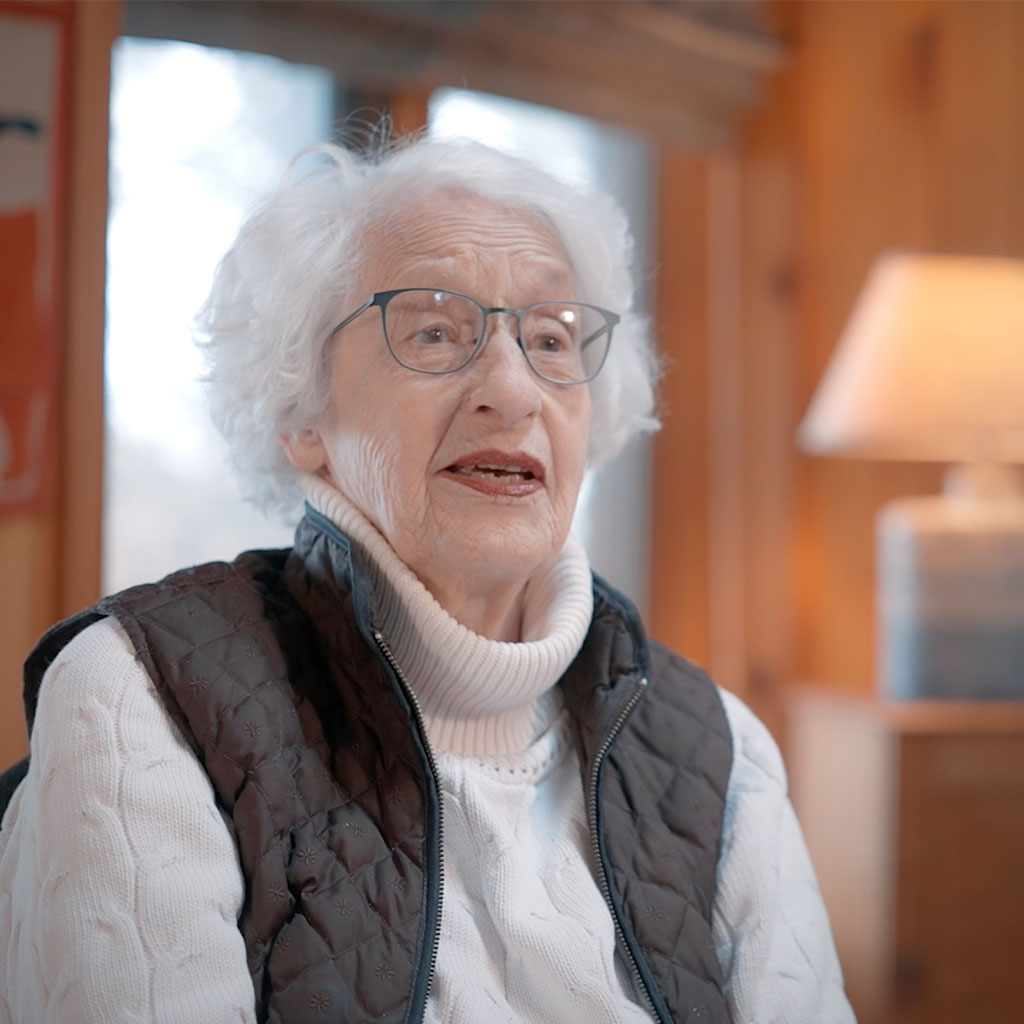
Neighbour and best friend of Denise Eve Powell for more than 90 years. They lived on the same street in Toronto when they volunteered together for the Ontario Farm Service Force. They experienced the hard work as expected but the fun times of hitchhiking to Niagara Falls remain clear in the memories.
Doris admits that she crossed the border to buy cigarettes to resell at the camp! How is that for a revelation? As she tells the stories of tying up grape vines and picking cherries and strawberries, she adds tidbits of the other memories.
She didn’t want to work in the canning factories that abounded in the Niagara area. Rumours were that you worked harder on the fruit processing line and were paid less. In fact the Farmerettes were paid the same hourly rate, but you couldn’t get that important tan if you were working inside. If Doris had worked in the factory, she would have been peeling blanched peaches and dropping peach pits into a pail at her feet. When the pail was turned in and the pits counted the supervisor knew if the Farmerette was doing her share.
Doris recalls it was a time of growing up and learning you had to follow through when instructions were given. Memories that still bring a smile to her face.
She remains proud of her service, as she should. Living close to Denise is a bonus for both ladies.
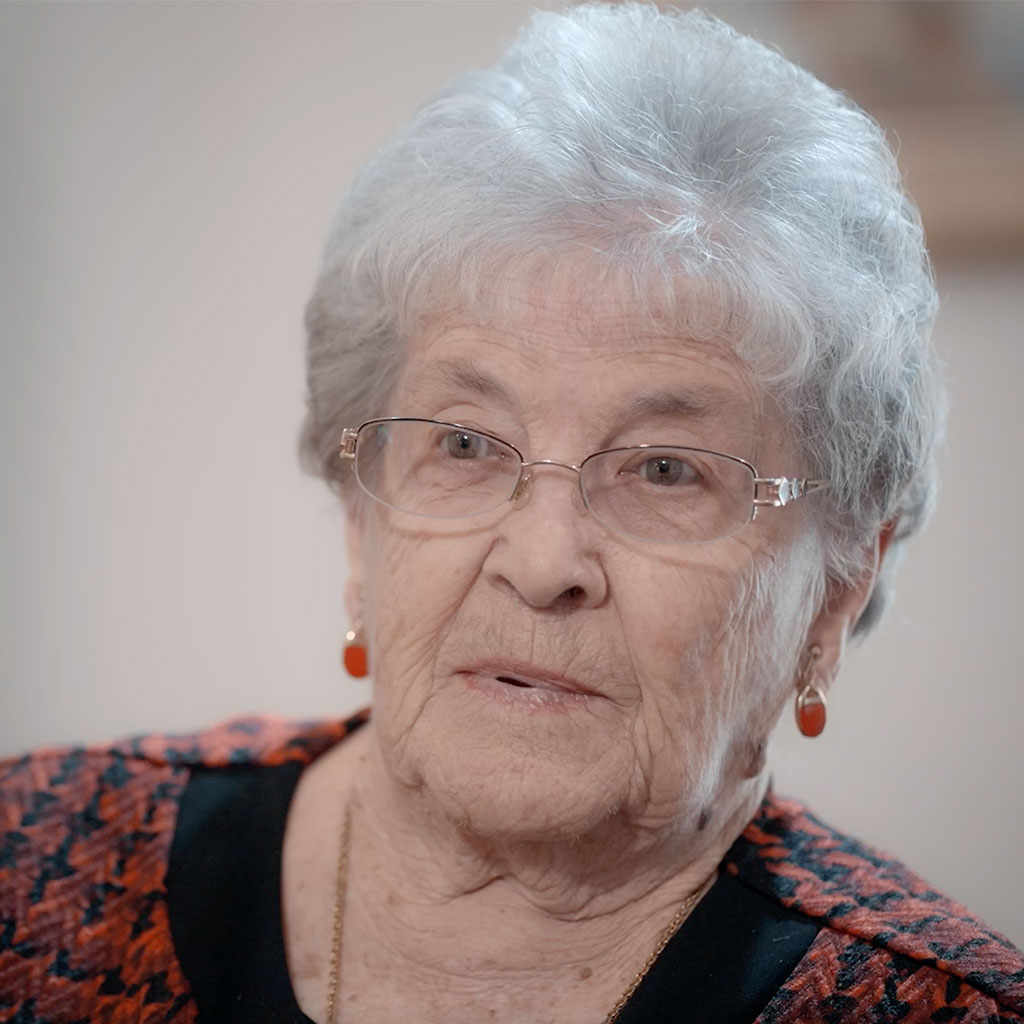
Miriam Edwards Carter was born in 1926 in Toronto. At age 18 and with high school completed, the plan was she would work that summer alongside her father
in his pharmacy. Following that plan in 1944 would prepare her to attend university to become a pharmacist. As so often happens, plans changed and he agreed she could volunteer to be a Farmerette. She applied to the Ontario Farm Service Force and was accepted. Tickets and baggage tags arrived for the journey to Vineland Station.
Miriam recalls there was a bumper crop of cherries that summer. Her farmer was A.W. Smith, a well respected farmer in the Niagara area and he told the girls they could ship 3 six quart baskets of cherries to Toronto for one dollar. Miriam couldn’t resist that deal as her Mom loved cherries! So she picked the cherries and the more she thought about how her Mom loved cherries she decided to spend two dollars of her hard earned money and then she splurged and decided to spend three dollars and send nine quarts of cherries via rail to her Mom.
So on the hottest day in July the cherries were delivered to her Mom’s doorstep.
Remember in those days there were no home freezers and no home air conditioners. Mom called all over Toronto, begging friends to come and share in the bounty. Miriam said her Mom probably felt like “killing her”.
The story didn’t end there! Miriam took three camp friends home with her via the S.S.Cayuga. They lived in Ottawa and had no hope of going that distance for the weekend so why not invite them to have a weekend in Toronto. More work for Mom with three guests. Life is full of surprises!
Another memory involves how the Farmerettes named the 4 outhouses after famous hotels. No need to say you were off to the “John”. You could be much more sophisticated and say I am off to the “Waldorf Astoria, the Park Plaza, the Chateau Laurier or the Royal York”.
Miriam asked Bonnie if she remembered the name Emma Woiken. She didn’t, so she related how Emma came from Ottawa and worked for 2 weeks. She was older and working in Ottawa so it would have been her holidays. Later she was convicted of spying and sentenced during the Gouzenko cypher spy case.
The tidbit that she volunteered at the Vineland Station Farmerette camp was not mentioned in her biography. Miriam felt it should have been mentioned!
Miriam not only became a pharmacist but met her husband while studying to become a pharmacist. Her father made the right decision to allow her to volunteer to aid in food production.

Gloria registered to be a Farmerette for the summer of 1942 and arrived at the Clarkson Farmerette Camp in early June.
Her instructions from the Ontario Farm Service Force were to report to a camp that was in a converted motel on Highway 2 between Clarkson and Oakville, Ontario.
When she arrived she was greeted by the Camp Mother who showed her around the main building, washrooms, laundry, and dining area, and to the bunk house that would be her home for the season. It was basic with very little storage space. There were other small buildings that housed the older girls. The bunk house was for the younger girls. Arriving at the camp early, Gloria managed to claim a lower bunk.
She remembers there were girls from communities all over Ontario, even Timmons, and a few from Quebec. Many new friends were made that summer and some were penpals for years afterwards. One girl, Esther Burnie from Hanover, kept in touch until 2013.
In the main building, there was a place to do personal laundry. Sheets and pillow cases were washed by camp staff. In the same building there was a kitchen and dining room and recreation area.
Saturday night tables and chairs were pushed back and the girls played music and danced. Local boys were allowed to come into the camp on Saturday nights to dance with the Farmerettes. There was a Farm Cadet Camp down Highway 2 that invited the girls to a dance at their camp.
One night Gloria's brother came to visit from Toronto and Gloria remembers they enjoyed dancing together. He did ask other girls to dance too and the next day the girls who had enjoyed dancing with him suggested to Gloria that she ask her brother to bring his boy friends for the next Saturday dance and he did!
Early, too early, mornings, the Farmerettes were picked up by the local farmers to work on their farms. Gloria was always chosen by a Mr. Bourne who specialized in fruit farming.
The first job she did was replanting the strawberry "runners" into new rows. Picking strawberries, then weeding and hoeing vegetable gardens and then back to picking currants, cherries, pears and early apples made the summer pass quickly. Gloria remembers the girls eating a lot of fruit and being nervous about the bees.
On hot, hot days after lunch the girls would take off shoes, roll up their overall legs and wade and splash in the spring fed, ice cold pond. It cooled them off for the afternoon heat.
To this day she is so proud that she did her part in helping the war effort. She recalls the experience as the most fun ever. After working outside in the fresh air and sunshine, she returned home healthy and happy.

In the spring of 1941, sixteen-year-old Jean embarked on an unforgettable adventure. It was her first taste of independence. Leaving behind her aunt, whom she had been living with in Toronto and who had given her permission to join the Farmerette Brigade she traveled to the St. Catharines area. The date May 10th. is firmly embedded in her memory. Jean stepped off the train and was met by a farmer and taken to her summer home which was a tent. In short order she began meeting other teenagers who volunteered to do backbreaking farm labour.
Under the watchful care of a YWCA Labour Secretary, housemother and cook, Jean and her fellow "Farmerettes" settled in and quickly learned the camp rules about curfews and checking the posted list of where they would be assigned to work and when the farmer would pick them up each morning.
Her days were filled with transplanting, hoeing, and harvesting seasonal crops. Cutting asparagus came first and then it was time to pick strawberries. Cherries and peaches meant climbing ladders and her gymnastics training helped her endure the physical demands. She quickly bonded with the other girls and with Leo the black Great Dane who seemed to feel it was his personal responsibility to make sure Jean was safe when she was at camp.
Saturday night dances at Port Dalhousie Lakeside Park not only attracted local boys but American visitors and Air Force trainees. Big Band music was popular but so was the dance called the "jitterbug".
Sundays were sometimes spent exploring Crystal Beach and Niagara Falls. Such outings meant hitchhiking with newfound friends. Hitchhiking in groups of 3 or more for safety was the rule.
Despite a painful sunburn incident, Jean thrived in her time spent as a Farmerette.
When the harvest was finished and the camp was ready to close, Jean made a bold decision not to return to Toronto. She continued to live in the tent and hitchhiked back and forth into St. Catharines job hunting. She secured a job as a stenographer in a local factory and found accommodation in St Catharines. Tent life came to an end.
It was there that she met the man she married in 1943.
Reflecting on that Farmerette summer, Jean recalls it with great pride. It was probably one of the best summers of her life.
Unforgettable camaraderie followed by the huge leap into adulthood amidst the uncertainties of wartime Canada.
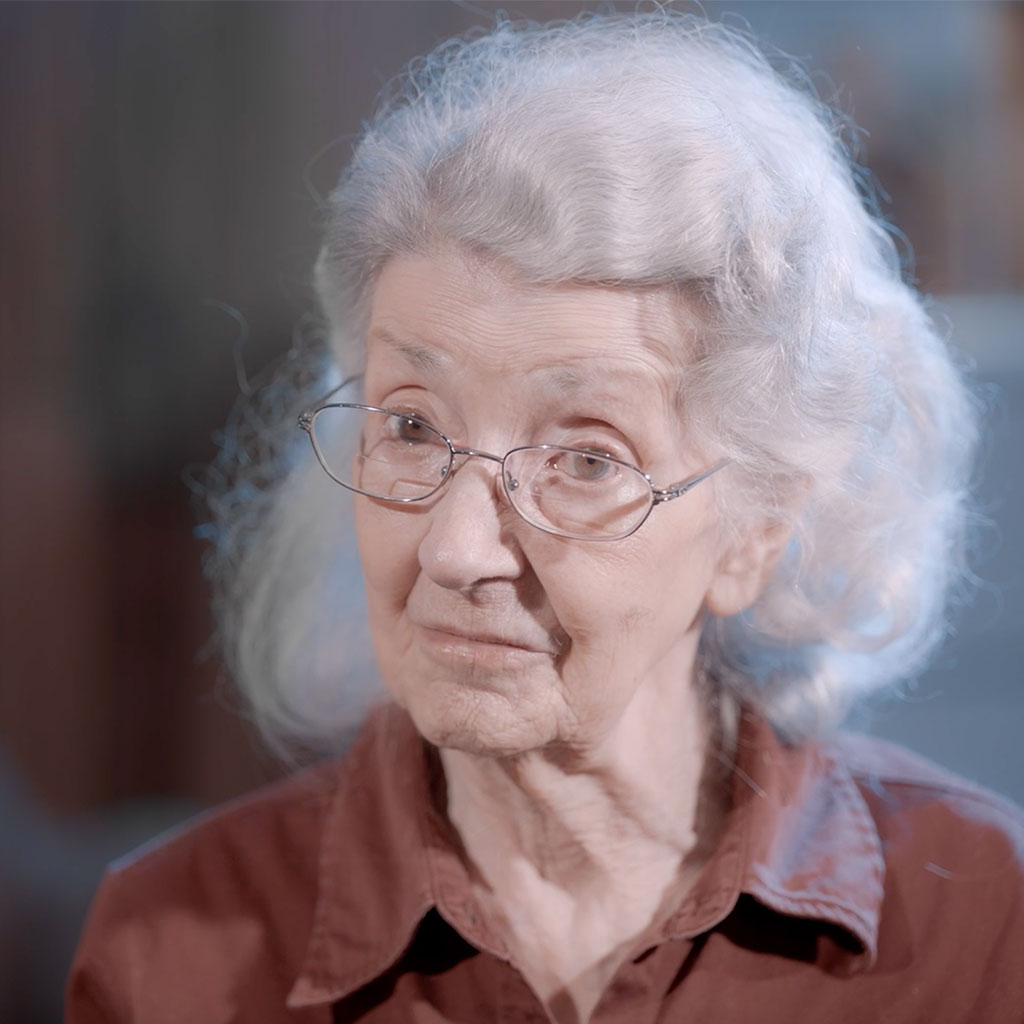
In the summer of 1946, seventeen year old Joan embarked on an unforgettable adventure as a Farmerette at Thedford Camp #6. Alongside her friend Peggy, Joan arrived from Aurora in late June, stepping into the grueling yet transformative world of agricultural labour. The endless rows to be weeded in the onion fields under a relentless sun meant Joan’s early days were marked by exhaustion. She recalls that the Farmerettes became mentally and physically strong as they adapted to the conditions. Pale skin became sunburned and eventually tanned and sore muscles and backaches healed.
Teamwork in the fields brought moments of joy and camaraderie blossomed. Weekends brought reprieve. Like Farmerettes in other camps, hitchhiking was the mode of transportation. There were trips to Ipperwash Beach, where Peggy turned heads wearing a daring bikini. Dancing with local boys to music supplied by a live orchestra at the Lakeview Casino in Grand Bend was a highlight of the summer. Lake Huron and the sandy beaches energized the girls.
Life at camp buzzed with the energy of fun-loving teenage girls, sharing clothes, laughter, and loyalty, exemplified by their unspoken pact to protect “Millie,” a friend who defied curfew but managed to avoid being caught and sent home.
The summer also held unexpected encounters. While working in the fields, Joan and her fellow Farmerettes spotted workers in a field nearby. They were German POWs. They were captured submarine sailors interned in Canada. Initial fears about German Supermen gave way to curiosity and empathy as the girls and POWs met at the fence. Their brief connection was a poignant reminder of how far war reaches. They had been sent to Canada where there was more food and farm labour was needed.
As August waned, the onion harvest continued, and Joan and Peggy "stayed on" after the camp officially closed. For two additional weeks they were housed in the farmer's home. There was still work to be done at the onion screening tables at the Sitter farm. Returning home in mid-September—tanned, muscular, and sun-bleached—Joan was a picture of vitality.
Joan and Peggy both studied art in Toronto and became recognized artists. Joan continues to paint and participate in art shows. Her oil painting of Farmerettes titled "Time Out" is the image used on the note cards produced as a fundraiser for the documentary, We Lend A Hand: The Forgotten Story of Ontario Farmerettes.
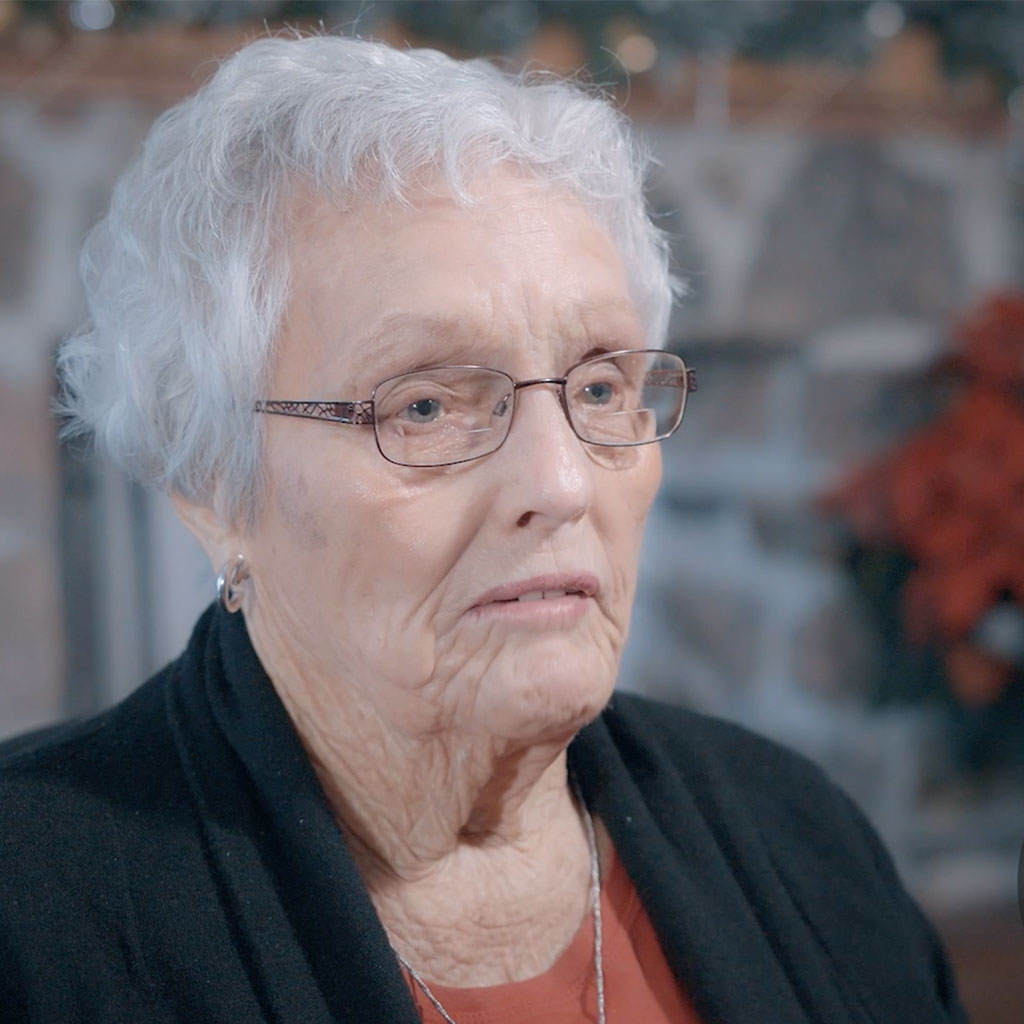
Born in 1931, Dorothy was 16 and eligible to be a Farmerette in 1947.
Thedford Camp #6 became her summer home as she pledged to work for at least 13 weeks doing farm labour.
Dorothy recalls that it was the fun, friends and freedom that made the special memories for her. It was where she started living "outside the box". She remembers clearly being in her high school classroom, not interested in the lesson, and perusing the magazine called Canadian High News. She spotted the application to volunteer for the Ontario Farm Service Force and almost without thinking, she completed the application and mailed it off to the Toronto address.
Not long afterwards she received the train tickets, baggage tags and instructions of what to pack for camp. She had told no one of her plans, not even her parents! It didn't go over well and her Dad said, "girls do not do that".
Dorothy begged long and hard and her parents finally accepted her plan and signed the form that allowed her to go to Farmerette Camp. For a girl from Athens Ontario, who had never been more than 50 miles from home, it was exciting.
Dorothy followed through with her plans. On arrival in Thedford she met girls from all over Ontario. Many were from the northern part of the province and were much further from home than she was. The sleeping accommodation was bunk beds on the upper floor of a converted grist mill located not far from the Thedford train station and Main Street. She settled in, determined to make her plans for a great summer work.
The girls were up early five days a week. They ate a prepared breakfast and made their bagged lunches. They faced ten hours of labour when the farmers arrived to pick them up. The first 2 weeks were difficult.
It was the adventures on weekends that involved hitchhiking and crossing the border to Detroit to try on clothes no one could afford to buy that made it all worthwhile. Swimming in Lake Huron and enjoying the sandy beaches are fondly remembered too. Dorothy doesn't recall any squabbles with the other girls.
Her photos of girls scantily clad with wide grins continue to make her smile. Those photos, found after 70 years of being stored in a Laura Secord chocolate box, were saved for a reason! It remains the best time in her life. After Farmerette Camp, she continued to "just do it" and she has had an adventurous and memorable life.
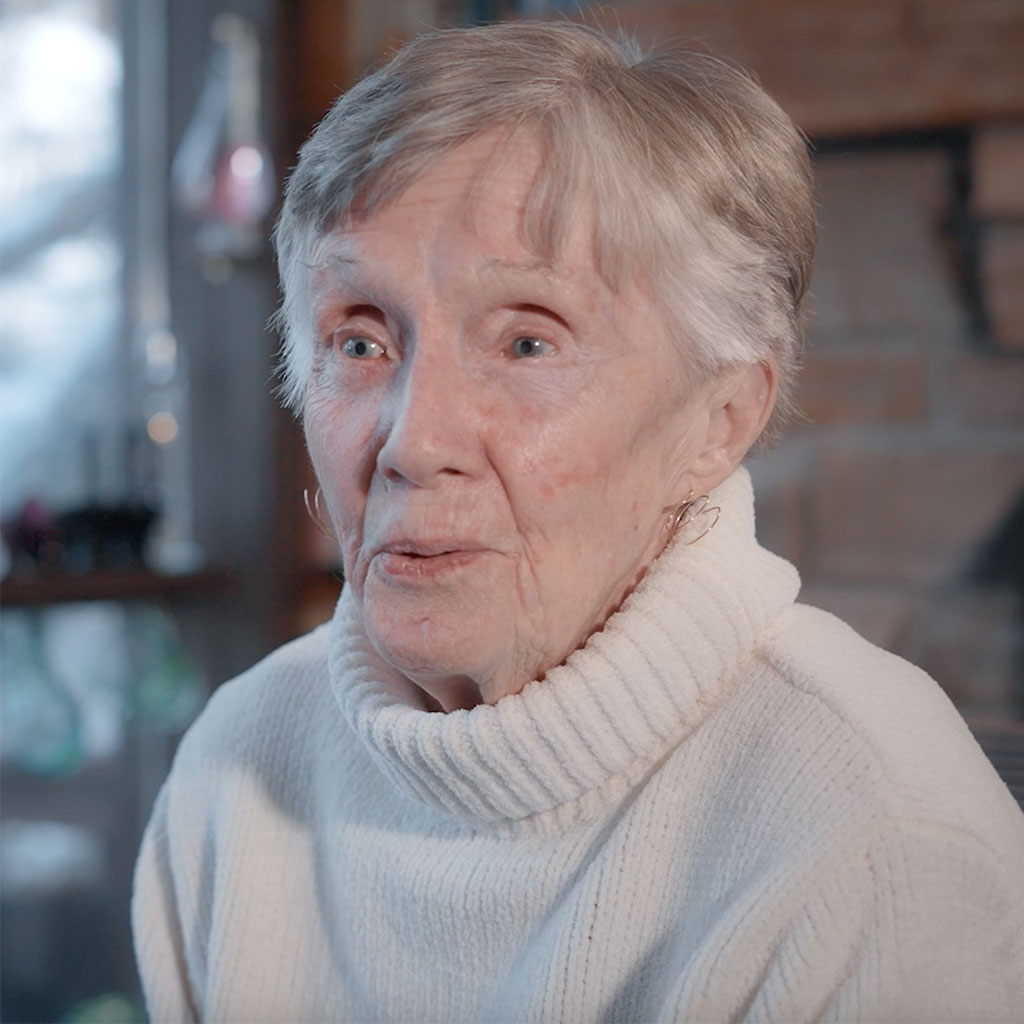
In her evocative memoir, Mary reflects on her summer as a Farmerette in Vineland, Ontario. It was 1946 and food was desperately needed to help feed Canada’s service men and women and our allies.
Born in Toronto, and at age 16, Mary joined the ranks of other young high school students who volunteered to support the war effort by working on market garden farms and orchards and in canning factories.
She embarked on an adventure that began with a bus ride from downtown Toronto. The Ontario Farm Service Force must have invited the Globe and Mail newspaper photographer to show up for a photo opportunity and capture the excitement with the girls giggling in anticipation of the unknown. The newspaper photo is a treasured keepsake of that day.
The destination was the Experimental Farm Camp at Vineland.
Her home for the season was a bunkhouse that she shared with about 50 other Farmerettes. They settled in under the watchful eye of a grey-haired Camp Mother and quickly learned the curfew rules after handing in their ration books to the Camp Cook.
Mary’s days were filled with picking strawberries and other fruits and then it was time to harvest the peaches. Days were long and hot as the crops ripened. She recalls she earned 4 cents a quart for strawberries. Not only did every muscle ache but sunburns added to the physical pain. Weekends brought carefree moments by the lakeshore, tanning with baby oil and iodine.
There were fleeting romances too, including a beautiful gold compact gifted by a boy named Bill. Never to be forgotten were mischievous escapades, like hitchhiking to Buffalo to visit a friend’s aunt.
Musical evenings at camp revealed the spirited camaraderie among the girls making their own fun.
Singing popular tunes of the day and discussing boyfriends and movies no doubt helped the time pass as they laboured in the fields and orchards.
Despite local disapproval from a nearby Mennonite community, possibly because they rolled up their pant legs as high as possible, the Camp Mother fostered unity through a musical outreach effort. For some reason, Mary remembers singing Christmas Carols at a get together with them.
Though memories of her departure and lasting connections with fellow Farmerettes have faded, the vivid snapshot of that transformative summer endures, as does her ability to name nearly every girl in that newspaper photograph.
Mary returned the following year but this time was on staff helping with cooking and cleaning and shopping for camp supplies. Added to her memories was the fact she was called on to help the girls with their needs. Everything from homesickness to first aid measures to being a listening post if venting was needed.
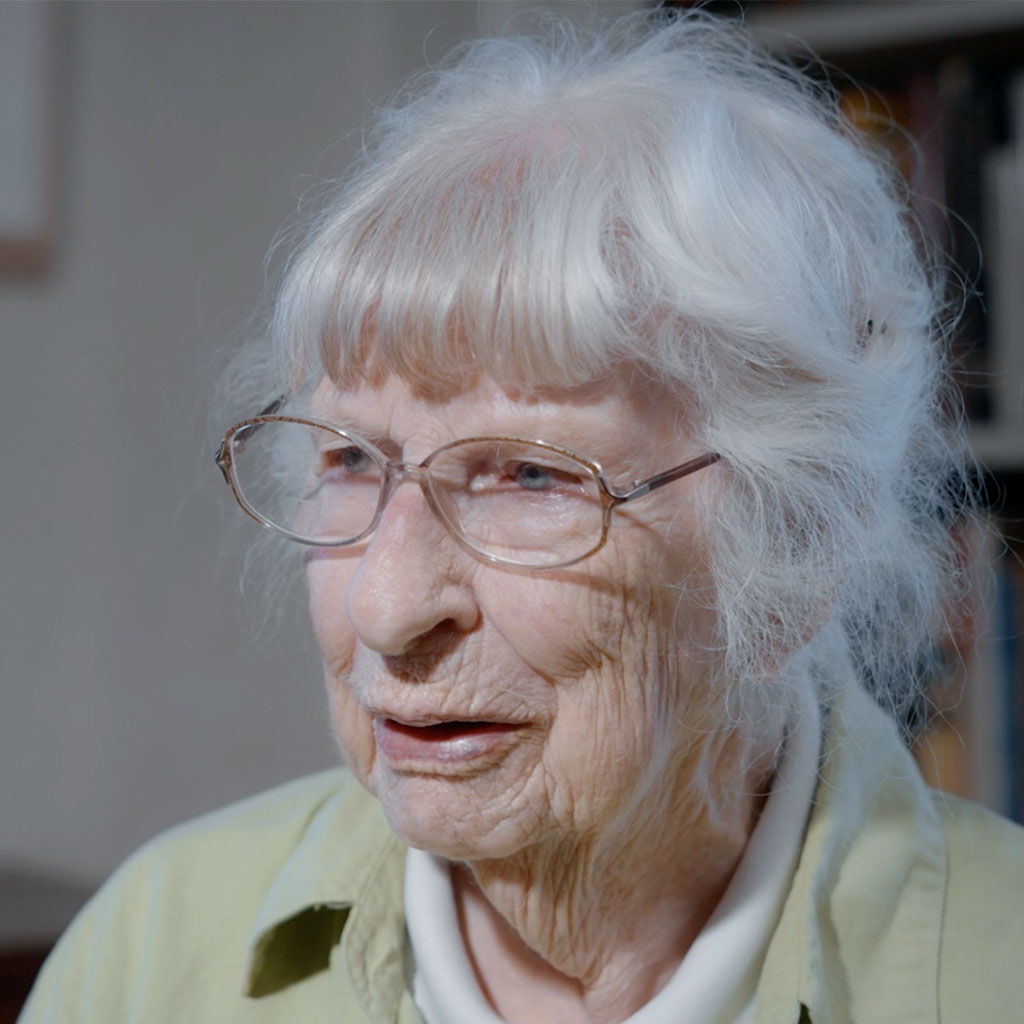
Born in Toronto in 1925, Joyce hailed from a Halliburton family with a strong military background. Her father, Major John Finlay, had served in World War I in the Canadian Railway Troops and was awarded the Military Cross. All of her male relatives had served. Her mother, Lillian, a University of Toronto graduate, volunteered to teach school in Haliburton during WW1 because the male teachers had all enlisted.
With this service to the country in mind, Joyce joined the Farmerettes from 1942-1944. Joyce’s younger sister, Joan, and her mother, Lillian were also involved. In fact, Lillian was a Camp Mother who traveled between different Farmerette camps as a supervisor.
Because Joyce was a redhead and susceptible to sunburn, she did not work in the fields with the other girls, although she did pick peaches in the early fall under the leafy cover of the trees. Her main responsibility was keeping the quarters clean and organized and helping in the preparation of meals.
Joyce did not live in the same dormitory setting like most of the Farmerettes, but shared a small Nissen hut with another member of the household staff, her friend Molly Fujita. Molly was Japanese Canadian and her family had been interred from Canada’s West Coast. Molly volunteered for service with the Farmerettes and she never felt the situation was unfair. Like Joyce she was happily determined to do her part for her country.
Joyce worked summers at Camp St. Davids, Jordan Station, and for a few weeks in Kingsville.
She graduated from the University of Toronto in Fine Arts in 1948 and worked at the University Library until her marriage in 1951 to Jack Jones, who had served in the Navy during the Second World War.
Joyce continues to reside in her beloved stone farmhouse near Port Hope with her extensive collection of books. As she reaches her 100th birthday in 2025, she has fond memories and a photo album of friends from those years. She served her country like her family before her. Being included in the documentary We Lend A Hand: The Forgotten Story of Ontario Farmerettes acknowledges that service comes in many forms.
In her evocative memoir, Gloria reflects on her summer as a Farmerette in Vineland, Ontario. It was 1945 and the year that the Second World War ended.
All you have to do is first, sign up for either Rotten Tomatoes, Letterboxd or IMDb. Then, click on the film’s page. Finally, leave us a review or just how many stars you think this story is worth. Every review counts to make We Lend a Hand accessible across country and, eventually, the world.